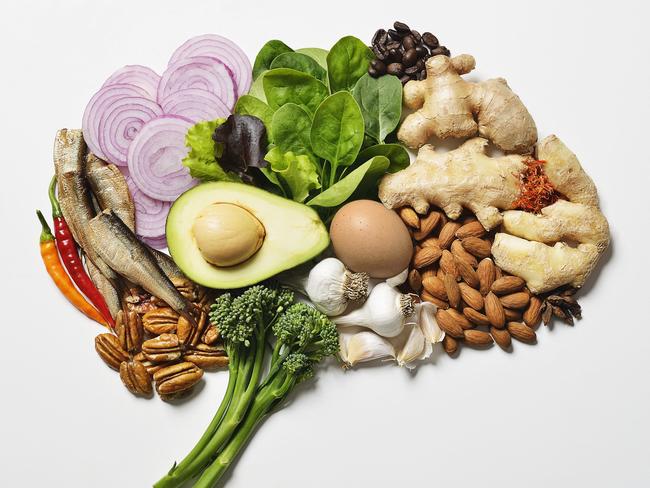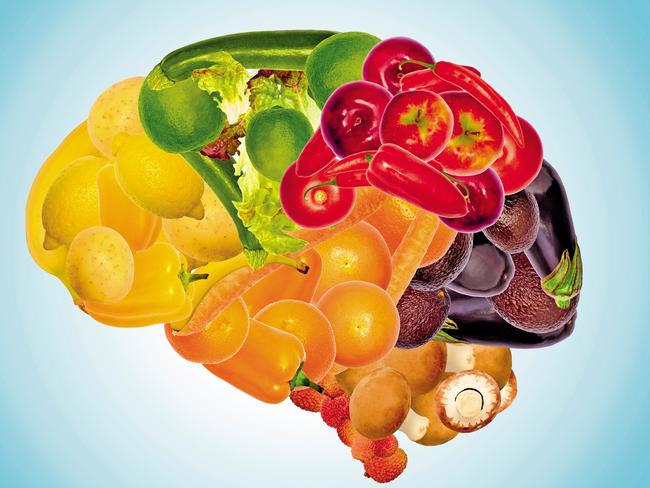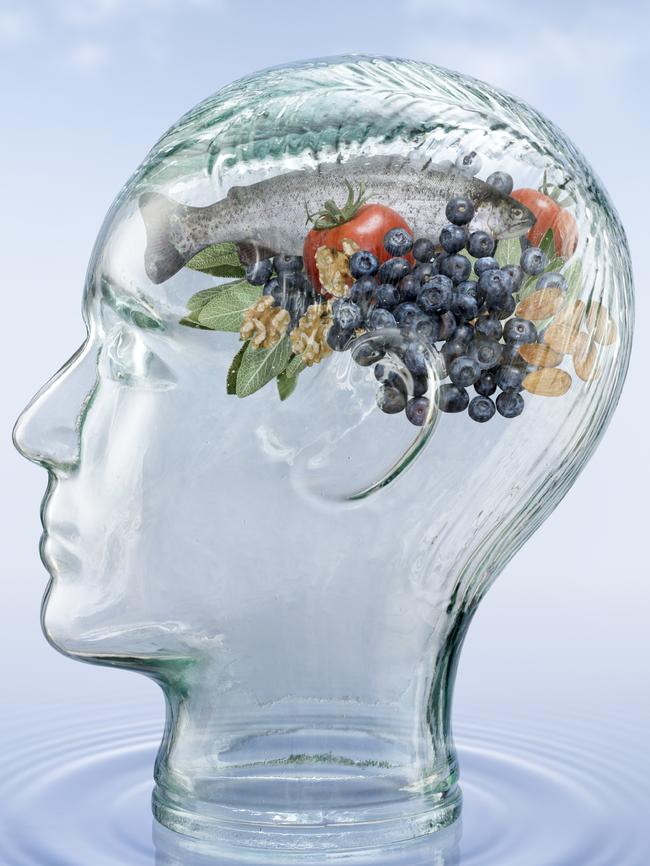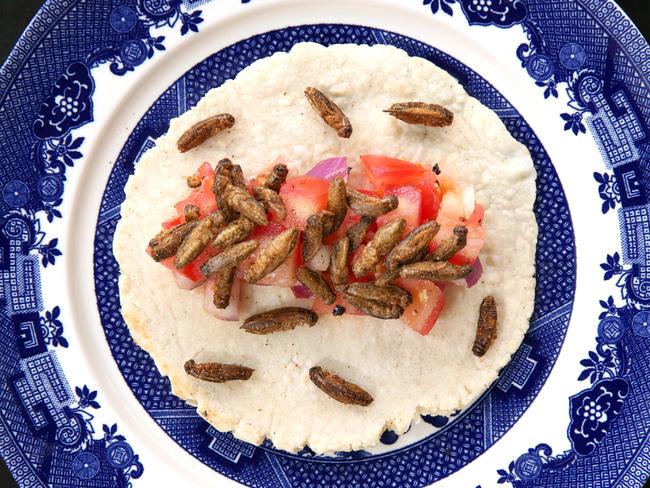Boost your brain power: Eat your way to a better mind
FROM preventing Alzheimer’s disease to treating depression, the field of neuro-nutrition is making some remarkable discoveries about the top nutrients for brain performance.
Body+Soul Daily
Don't miss out on the headlines from Body+Soul Daily. Followed categories will be added to My News.
- WORLD EXCLUSIVE: Inside the controversial Mexican clinic saving Aussie kids
- Blood cure for arthritis injects new hope into sufferers
WHY does India have such low rates of Alzheimer’s disease? It may come down to the country’s high intake of the spice turmeric, which has recently been hailed by the King George’s Medical University in India as a “protective shield” against dementia and a tool for slowing the disease’s progress.
It’s just one of many findings in neuro-nutrition, a new field of research that’s gathered pace in the past few years as scientists discover the magnitude of food’s effect on the brain’s ageing and other functions.
“What we eat is the foundation on which our body and brains are built,” says Edward Hill, a researcher in nutrition and brain ageing at The University of Melbourne.

“And in recent years there’s been a push to define nutrients and dietary patterns that give us the best shot at preserving our cognitive abilities.”
Some of the most important work is being done in Australia.
Last year, a world-first trial at the Food & Mood Centre at Deakin University in Victoria showed that a Mediterranean diet (which is rich in fresh produce, fish, olive oil, wholegrains, nuts, herbs and spices, and allows a moderate amount of antioxidant-rich coffee and red wine) can help treat major depression.
The diet participants showed a significant reduction of symptoms, with 30 per cent in remission after three months.
It may not be long before the prescription of certain foods or diets will become part of standard mental health treatment.

And it’s not only foods that are being investigated in this field, but food-derived supplements, too. One recent study, published in The Journal of Prevention of Alzheimer’s Disease, found that cognitive function improved in a group of elderly people who were given a multi-nutrient supplement for two months.
So, what does this all mean for the majority of us?
“There’s a lot you can do to boost your brain health,” says Professor Philip Beart, of the Florey Institute of Neuroscience and Mental Health in Victoria, adding that a big factor is managing inflammation, which occurs with forms of brain injury or dysfunction, including ageing.
“If you keep the inflammatory cells healthy then you have a good chance of reducing dysfunction,” he explains.
“And a lot of these good foods are anti-inflammatory.”
Here are the best nutrients for brain performance according to science, and how to start loading up on them today.
8 NUTRIENTS FOR A SUPER-CHARGED BRAIN
EPIGALLOCATECHIN- 3-GALLATE (EGCG)
EGCG is a nutrient in green tea. Its cardiovascular benefits are well known, but its positive effects on brain cells are a more recent discovery.
EGCG helps generate neuron cells in the hippocampus, the area of the brain that processes information from short-term to long-term memory. A 2017 review of green tea and its effects on cognition, mood and brain function supported its beneficial effects. Two or three cups a day are ideal.
QUERCETIN
QUERCETIN is found in lettuce, apples, onions, berries, broccoli, tomatoes and guavas.
“In the longer term, in rodent models, it’s benefited cognition, learning and memory,” Beart says.

DHA
AGEING is linked to lower brain levels of the omega-3 fatty acid DHA, according to UK-based nutrition professors Ricardo Uauy and Alan Dangour. Fish and fish oil tablets are good sources of it.
TURMERIC
TURMERIC is a herb with an antioxidant and anti-inflammatory effect that you can use in cooking or take as a supplement.
When tested on people with Alzheimer’s disease, turmeric helped reduce inflammation.
“Turmeric contains curcumin, which is a free radical scavenger,” Hill says.
“Free radicals in our body cause damage and increase the likelihood of inflammatory diseases, such as Alzheimer’s.”
LUTEIN
LUTEIN is a pigment in leafy green veg, broccoli and egg yolks that has a protective role. A team at the University of Illinois in the US found that daily leafy greens help preserve “crystallised intelligence” — the ability to use skills acquired over a lifetime.
RESVERATROL
RED wine is rich in the antioxidant resveratrol.
“It’s associated with clearance of beta amyloid, a protein linked with Alzheimer’s,” Hill says
Fisetin
Fisetin is a molecule found in strawberries.
“It travels into the brain, where it blocks oxidative stress and inflammation,” Beart says.
MONOUNSATURATED FATTY ACIDS (MUFAS)
FOUND in olive oil, nuts and avocados, these healthy fatty acids support the brain’s attention network and help with cognition, according to research conducted by the University of Illinois in the US.
THE BOTTOM LINE
IF YOU want to keep things simple and still save your brain, go with this advice from Beart:
“Fruits, vegetables, wholegrain cereals, low-fat milk, fish and green tea are all anti-inflammatory in addition to having antioxidant properties.
“Limiting sugar, saturated fat and fast food also helps reduce inflammation — a pretty simple and effective way to help your brain. Some supplements can also be helpful, such as turmeric and fish oil.
“Remember that what you eat has to be part of a complete package that includes exercise, maintaining social connections and keeping your brain stimulated.”

ARE BUGS THE FUTURE?
RESEARCHERS are investigating insects as a source of brain-boosting nutrients. Crickets, for example, are high in iron and vitamin B12, and also contain calcium — which are all important for your brain function. Some caterpillars also contain zinc and magnesium.
That said, you probably won’t be snacking on a cricket sandwich any time soon, but instead finding them processed into cereals and bread.
“Just as we have vegetarian products that use protein and are made to look like the meat products they replace, I think there will be an insect equivalent,” predicts dietitian Nicole Senior.
